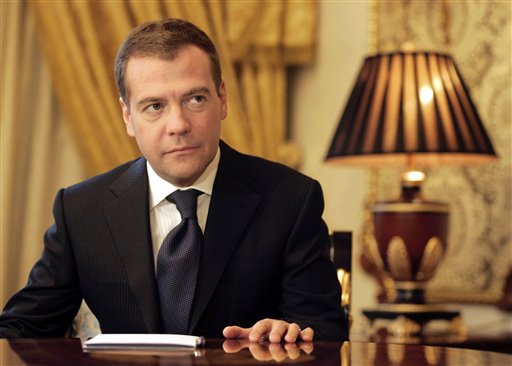
MEDVEDEV RESTRUCTURES THE INTERIOR MINISTRY
Publication: Eurasia Daily Monitor Volume: 5 Issue: 173
By:

President Dmitry Medvedev has launched a reorganization of Russia’s Interior Ministry that some observers say raises it in importance above the country’s other “power” agencies and ministries and could presage a stepped-up campaign against the Kremlin’s critics and political opponents under the guise of fighting “extremism.”
Medvedev signed a decree on September 6 abolishing the federal Interior Ministry’s department for the fight against organized crime and terrorism (DBOPiT), along with the corresponding Interior Ministry units in the federal districts and the regional anti-organized crime departments (UBOPs); and on their basis he created new units tasked with fighting extremism. Under the decree, anti-organized crime functions will be transferred to the Interior Ministry’s criminal investigation and anti-economic crime departments.
As Kommersant noted, the ministry’s former anti-organized crime fighters will now concentrate on fighting “extremism” and protecting officials of the judicial branch, including judges, prosecutors, investigators, and witnesses in criminal prosecutions. According to Kommersant, Medvedev’s decree specifies that the Interior Ministry’s anti-organized crime functions will now be carried out by the criminal investigation department, while the fight against corruption and organized economic crime will be carried out by the ministry’s anti-economic crimes units. Meanwhile, a separate unit will be formed to provide protection for judges, prosecutors and others involved in judicial proceedings.
Kommersant quoted an anonymous high-ranking Interior Ministry officer as saying, “In the 1990s, more than 10 large organized crime groups were operating in the country, several of which numbered hundreds of armed fighters; gangster showdowns with shooting and explosions took place daily. Today they are no such groups; some managed to dissolve themselves, and others were destroyed by the anti-organized crime units. It is possible that a special service is not necessary to fight the gangs that currently exist; the criminal investigation department can fully handle it” (Kommersant, September 10).
State Duma deputy Aleksandr Khinshtein told the www.gazeta.ru website that according to President Medvedev’s decree, a number of the Interior Ministry’s “operational-investigative bureaus” (OPB) will become “independent” units. “In particular, the OPB for fighting extremism will become an independent body with wider powers,” he said. Khinshtein added, however, that the Interior Ministry would not be exclusively tasked with fighting extremism. “There are similar units in all of the power agencies–in the Investigative Committee, the FSB [Federal Security Service], the FSIN [federal penitentiary service], Gosnarkokontrol [the state narcotics control committee],” he said.
Alexei Mukhin, general director of the Center for Political Information, however, told www.gazeta.ru that the creation of a new Interior Ministry to fight against extremism meant that the ministry would be strengthened relative to other power ministries and agencies. “Traditionally, the fight against extremism and terrorism here has been carried out by the FSB, but this decree diversifies these functions, that is, splits them up between two departments–the MVD [Interior Ministry] and the FSB,” he said. “This decree is unquestionably the result of lobbying efforts by high-ranking MVD generals; it considerably widens their powers.” Mukhin added that, in his view, it was no accident that Medvedev had signed the decree in the immediate aftermath of Russo-Georgian armed conflict over the Georgian breakaway regions of South Ossetia and Abkhazia. “The appearance of new departments allows the MVD to feel more comfortable, in particular, in hot spots; [it] gives them more freedom of action,” he said.
Russia’s opposition, meanwhile, fears that the new decree essentially legalizes methods of fighting against political dissidents that regional anti-organized crime units (UBOPs) have been using for some time without legal sanction. “While in 2005 and 2006, it was mainly FSB staff from the department to protect the constitutional order who were involved in our cases, a year and a half ago we called attention to the fact that we were being victimized mainly by UBOP,” Marina Litvinovich, a member of the executive committee of The Other Russia opposition group, told www.gazeta.ru, “Considering the fact that these units were created for the fight against organized crime, their methods of work are in keeping with that–killing, beating, putting a bag over the head [of a detainee]. To use all of this in dealing with people whose main crimes are their political views is, at the least, strange” (www.gazeta.ru, September 9).
According to Litvinovich, opposition activists have long sought to determine the legal basis, if any, for the actions of UBOP units. Following the death of National Bolshevik Party activist Yury Chervochkin, who, according to his comrades-in-arms, was beaten to death by the UBOP, members of The Other Russia collected testimony from opposition activists who had been the target of violence by UBOP officers. When the opposition sent this evidence to the Prosecutor General’s Office, however, they were given the runaround, Litvinovich said. In any case, while it was earlier unclear who was authorizing the regional UBOP units to work the way they did, now, with the new presidential decree setting up a special Interior Ministry department to fight extremism, “all of this will take place officially,” said Litvinovich.
It is worth recalling that earlier this year, Stanislav Belkovsky, head of the National Strategy Institute, predicted that Medvedev would ratchet up the pressure on the opposition under the banner of protecting democracy and battling extremism (see EDM, January 7 and 23).




